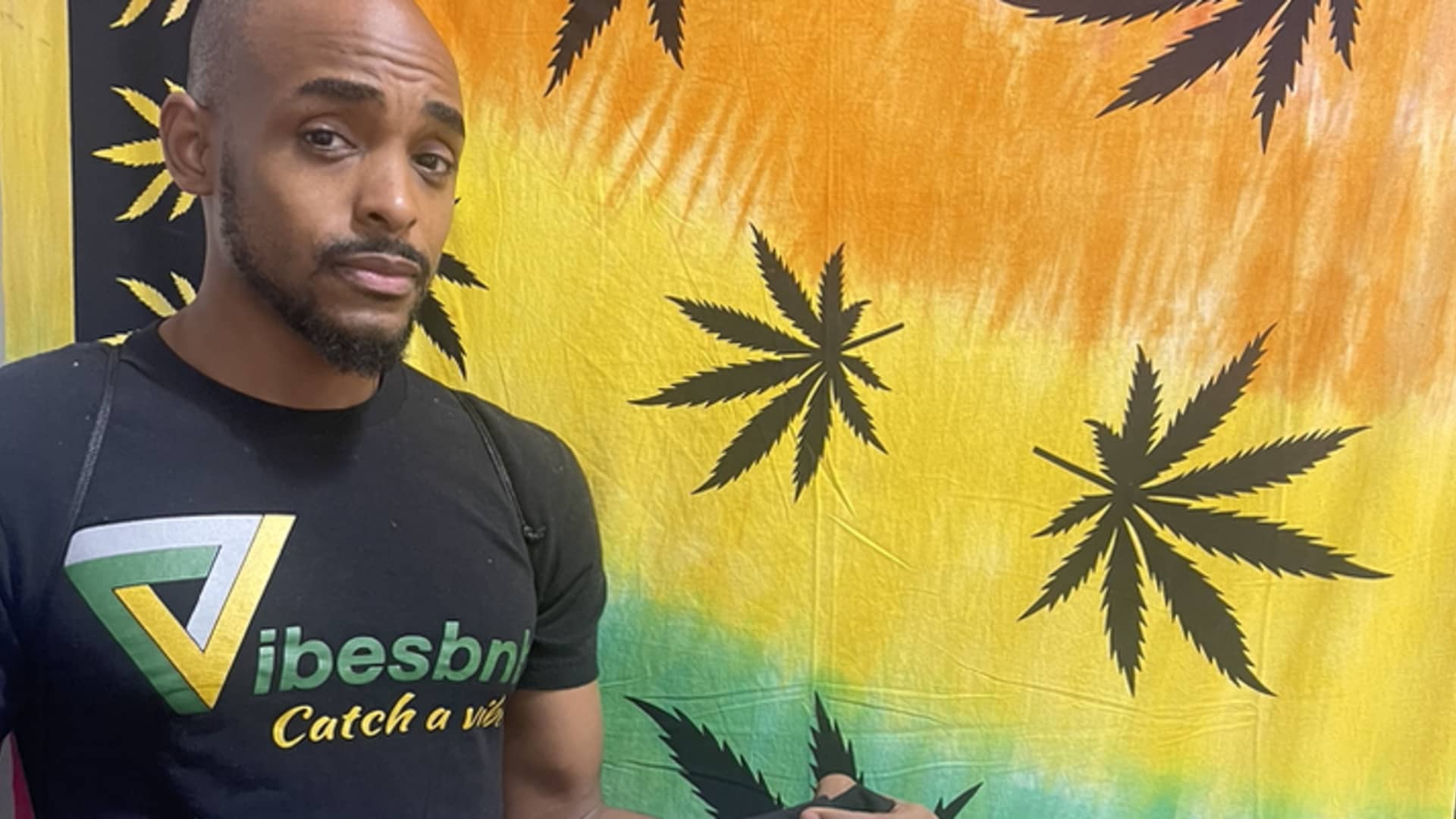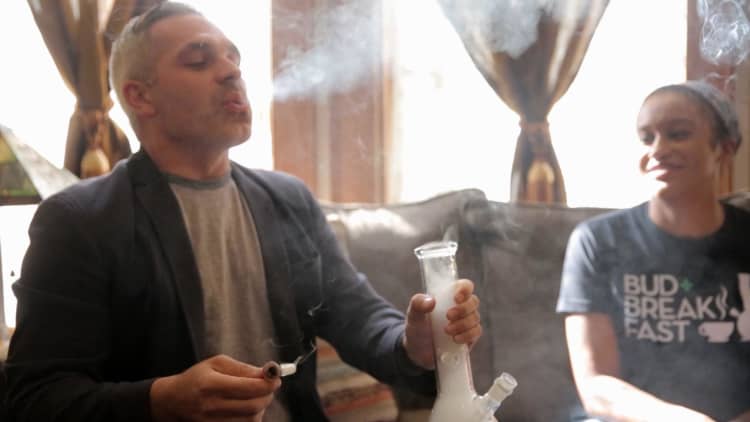
At her bed-and-breakfast Nicole Butler hosts backyard potlucks with THC-infused food.
Photo: Nicole Butler
At Nicole Butler’s bed-and-breakfast, cannabis is in the candy that greets guests at check-in, the homemade shrimp and grits and other meals she serves, and the snacks she sets out for anyone who gets the munchies.
“I’ve really just tried to give people what they’re used to, just with the added element of cannabis,” said Butler.
With permission from her landlord, Butler in 2018 began listing her 3-bedroom, 3-bathroom townhouse in Washington, D.C. on BudandBreakfast.com, which connects guests with hosts who allow marijuana use on their properties.
The site is still tiny, with just 2,000 active listings compared with Airbnb’s 6 million. But the niche market of cannabis-friendly accommodations is gaining interest, with recreational marijuana use now legal in 19 states and Washington. Tourism for cannabis more broadly is also now a $17 billion industry, according to recent data from Forbes.
Some hosts of cannabis-friendly rentals go beyond simply allowing people to smoke or consume weed on site. With rooms starting at $420 per night, for example, Butler offers a fully stocked cannabis bar with a variety of strains to choose from as well as yoga, CBD massages and cannabis education.
A hairstylist before the pandemic, Butler began managing the bed-and-breakfast full time when the salon she worked at closed during the pandemic. She said the business started to sustain itself after about a year.
“I think the pandemic made people really appreciate experiences, self-care, and just doing things that make them feel good,” said Butler.
A growing trend
Cannabis sales in the U.S. are projected to climb from $25 billion in 2021 to $42 billion in 2026, according to cannabis market research firm BDSA.
Among those looking to capitalize on the growing industry is Sean Roby, who launched BudandBreakfast.com in 2015. Homeowners can list their properties for short-term bookings in states where recreational or medicinal cannabis use is legal. When he first started the site, Roby said his business partners were doubtful about whether people would buy into the idea of letting guests smoke cannabis on their properties.
“We get dozens of bookings per day now,” he said.

On the site, listings indicate where in the house smoking is allowed, if cannabis will be provided or if it’s BYOB — bring-your-own-bud. They also include information on local dispensaries and cannabis-friendly events happening in the area.
“We have places that are booked out six months in advance,” Roby said.
Deontae Mack has also been courting guests with his online startup Vibesbnb.com, where he lists cannabis-friendly rentals. The site has more than 150 listings, mostly in Florida, and Mack said about 2,000 users have signed up in the first year.
Florida, one of the top vacation destinations in the U.S., still does not allow recreational cannabis use. But after voters approved a bill in 2016 allowing medicinal use on private properties, Mack, an Uber and Lyft driver at the time, saw an opportunity to cash in.
“People do not want to be inconvenienced when they smoke and some actually have medical needs,” Mack said. “But when people travel to Florida, if they do smoke for whatever reason, the only place that they can do that is at a private residence.”
Mack cross-lists on Vibesbnb and Airbnb. He said people can either book one of his listings on Airbnb or go directly to his site for cheaper booking.
Deontae Mack, founder and CEO of Vibesbnb
Courtesy: Deonte Mack
According to Airbnb’s community policy, cannabis possession and use is allowed “in locations where it is legal and does not violate any house rules.” However, the company does not allow users to directly search for cannabis-friendly rentals, or allow its hosts to list their rentals as such.
“If a guest is curious about a Host’s host rules on cannabis in their listing, we encourage guests to contact the Host ahead of booking to ask them for more information,” Airbnb said in a statement.
Mack took his plans for Vibesbnb to investors in 2019 after finding success listing his own, then other apartments that he rented, as cannabis-friendly stays on sites including Airbnb and Vrbo. He got around the site’s rules by putting “420 friendly” in the description, which let people find him through Google searches.
“I’m trying to become like the Airbnb of cannabis in Florida,” Mack said.
Cashing in
The cannabis industry’s move into the mainstream caught Jeremiah Swain’s attention while he was a student at Cornell University’s School of Hotel Administration.
“There are so many opportunities that the Black community is missing out on because of its traumatic response to marijuana, because of this traumatic history with the plant,” Swain said.
Swain and his classmate Cameron Wesley Scott founded a research-based cannabis company in Ithaca, New York. Swain said he hopes it will expand into one of upstate New York’s first boutique cannabis hotels, with about 65 rooms.
“We’re looking at mid- to late 2025, depending on how quickly we close our fundraising,” he said.
Construction hasn’t started, but he said he envisions an atrium-style area with live plants, spas and studios for art and yoga.
For now, the pair are cultivating cannabis for the recreational adult-use market in New York state through his 8th Wonder Cannabis Company. They received $300,000 in angel investments, but are still raising money to build the hotel.
From left, Cameron Wesley Scott, and Jeremiah Swain
Photo: Jesse Winter
Swain said the hotel, which he called “the nexus of cannabis and hospitality,” will be what allows minority entrepreneurs like him a chance to break into the industry.







